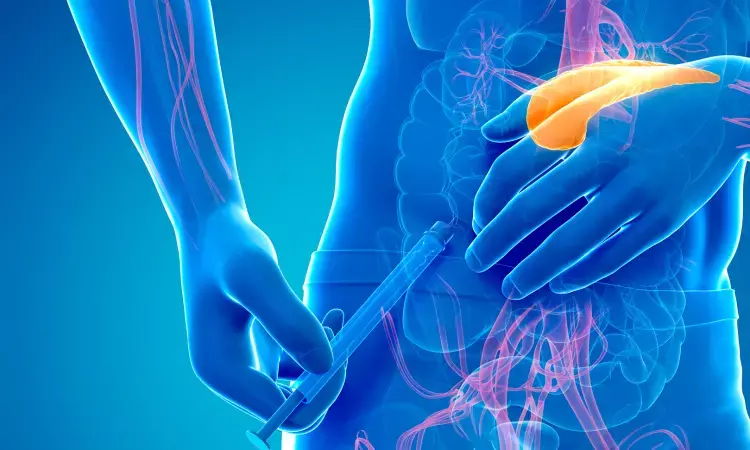- Home
- Medical news & Guidelines
- Anesthesiology
- Cardiology and CTVS
- Critical Care
- Dentistry
- Dermatology
- Diabetes and Endocrinology
- ENT
- Gastroenterology
- Medicine
- Nephrology
- Neurology
- Obstretics-Gynaecology
- Oncology
- Ophthalmology
- Orthopaedics
- Pediatrics-Neonatology
- Psychiatry
- Pulmonology
- Radiology
- Surgery
- Urology
- Laboratory Medicine
- Diet
- Nursing
- Paramedical
- Physiotherapy
- Health news
- Fact Check
- Bone Health Fact Check
- Brain Health Fact Check
- Cancer Related Fact Check
- Child Care Fact Check
- Dental and oral health fact check
- Diabetes and metabolic health fact check
- Diet and Nutrition Fact Check
- Eye and ENT Care Fact Check
- Fitness fact check
- Gut health fact check
- Heart health fact check
- Kidney health fact check
- Medical education fact check
- Men's health fact check
- Respiratory fact check
- Skin and hair care fact check
- Vaccine and Immunization fact check
- Women's health fact check
- AYUSH
- State News
- Andaman and Nicobar Islands
- Andhra Pradesh
- Arunachal Pradesh
- Assam
- Bihar
- Chandigarh
- Chattisgarh
- Dadra and Nagar Haveli
- Daman and Diu
- Delhi
- Goa
- Gujarat
- Haryana
- Himachal Pradesh
- Jammu & Kashmir
- Jharkhand
- Karnataka
- Kerala
- Ladakh
- Lakshadweep
- Madhya Pradesh
- Maharashtra
- Manipur
- Meghalaya
- Mizoram
- Nagaland
- Odisha
- Puducherry
- Punjab
- Rajasthan
- Sikkim
- Tamil Nadu
- Telangana
- Tripura
- Uttar Pradesh
- Uttrakhand
- West Bengal
- Medical Education
- Industry
Insulin Degludec non-inferior to detemir in pregnant women with T1D

Researchers have interpreted that among pregnant women with a history of type 1 diabetes, degludec is non-inferior to detemir.
This article entitled “Insulin degludec versus insulin detemir, both in combination with insulin aspart, in the treatment of pregnant women with type 1 diabetes (EXPECT): an open‑label, multinational, randomised, controlled, non-inferiority trial” is published in The Lancet Diabetes and Endocrinology.
Prof Elisabeth R Mathiesen, MD, explaining the study background, said Insulin degludec (degludec) is a second-generation basal insulin. It has an improved pharmacokinetic–pharmacodynamic profile in comparison to first-generation basal insulins. She further noted that the data regarding its use in pregnant women is limited. We investigated the comparison of efficacy and safety of degludec with insulin detemir (detemir), both in combination with insulin aspart (aspart), in pregnant women with type 1 diabetes.
Knowing about EXPECT trial:
The trial was conducted in 14 countries at near about 56 sites. Women included were at least 18 years with T1D (between gestational ages eight weeks and 13 weeks or planned to become pregnant.
These were randomly assigned (111 women to degludec and 114 to Detemir) via an interactive web response system to degludec (100 U/mL) once daily or Detemir (100 U/mL) once or twice daily, both with mealtime insulin aspart (100 U/mL), all via subcutaneous injection.
The primary and secondary endpoints were the last planned HbA1c measurements before delivery and efficacy, maternal safety, and pregnancy outcomes, respectively.
Based on the Findings, the following conclusion can be drawn:
- At pregnancy baseline, Mean HbA1c was 6·6% and 6.5 % in the degludec and detemir groups, respectively.
- The mean last planned HbA1c measurement before delivery was 6·2% and 6.3 % in the degludec and detemir groups, respectively, with an estimated treatment difference of 0·11%, confirming non-inferiority.
- When Compared with Detemir, there were no additional safety concerns with degludec.
The researchers concluded that degludec is non-inferior to detemir in pregnant women with T1D.
As acknowledged, the study was funded by Novo Nordisk.
Further reading:
BDS, MDS in Periodontics and Implantology
Dr. Aditi Yadav is a BDS, MDS in Periodontics and Implantology. She has a clinical experience of 5 years as a laser dental surgeon. She also has a Diploma in clinical research and pharmacovigilance and is a Certified data scientist. She is currently working as a content developer in e-health services. Dr. Yadav has a keen interest in Medical Journalism and is actively involved in Medical Research writing.
Dr Kamal Kant Kohli-MBBS, DTCD- a chest specialist with more than 30 years of practice and a flair for writing clinical articles, Dr Kamal Kant Kohli joined Medical Dialogues as a Chief Editor of Medical News. Besides writing articles, as an editor, he proofreads and verifies all the medical content published on Medical Dialogues including those coming from journals, studies,medical conferences,guidelines etc. Email: drkohli@medicaldialogues.in. Contact no. 011-43720751


